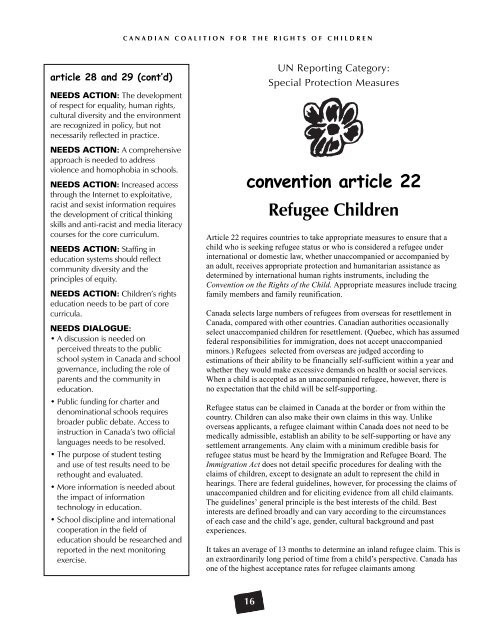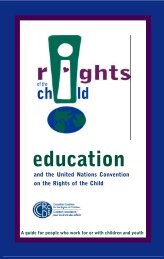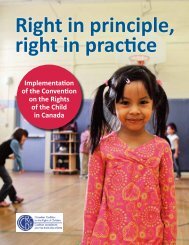Poste - Canadian Coalition for the Rights of Children
Poste - Canadian Coalition for the Rights of Children
Poste - Canadian Coalition for the Rights of Children
You also want an ePaper? Increase the reach of your titles
YUMPU automatically turns print PDFs into web optimized ePapers that Google loves.
article 28 and 29 (cont’d)<br />
NEEDS ACTION: The development<br />
<strong>of</strong> respect <strong>for</strong> equality, human rights,<br />
cultural diversity and <strong>the</strong> environment<br />
are recognized in policy, but not<br />
necessarily reflected in practice.<br />
NEEDS ACTION: A comprehensive<br />
approach is needed to address<br />
violence and homophobia in schools.<br />
NEEDS ACTION: Increased access<br />
through <strong>the</strong> Internet to exploitative,<br />
racist and sexist in<strong>for</strong>mation requires<br />
<strong>the</strong> development <strong>of</strong> critical thinking<br />
skills and anti-racist and media literacy<br />
courses <strong>for</strong> <strong>the</strong> core curriculum.<br />
NEEDS ACTION: Staffing in<br />
education systems should reflect<br />
community diversity and <strong>the</strong><br />
principles <strong>of</strong> equity.<br />
NEEDS ACTION: <strong>Children</strong>’s rights<br />
education needs to be part <strong>of</strong> core<br />
curricula.<br />
NEEDS DIALOGUE:<br />
• A discussion is needed on<br />
perceived threats to <strong>the</strong> public<br />
school system in Canada and school<br />
governance, including <strong>the</strong> role <strong>of</strong><br />
parents and <strong>the</strong> community in<br />
education.<br />
• Public funding <strong>for</strong> charter and<br />
denominational schools requires<br />
broader public debate. Access to<br />
instruction in Canada’s two <strong>of</strong>ficial<br />
languages needs to be resolved.<br />
• The purpose <strong>of</strong> student testing<br />
and use <strong>of</strong> test results need to be<br />
rethought and evaluated.<br />
• More in<strong>for</strong>mation is needed about<br />
<strong>the</strong> impact <strong>of</strong> in<strong>for</strong>mation<br />
technology in education.<br />
• School discipline and international<br />
cooperation in <strong>the</strong> field <strong>of</strong><br />
education should be researched and<br />
reported in <strong>the</strong> next monitoring<br />
exercise.<br />
C A N A D I A N C O A L I T I O N F O R T H E R I G H T S O F C H I L D R E N<br />
16<br />
UN Reporting Category:<br />
Special Protection Measures<br />
convention article 22<br />
Refugee <strong>Children</strong><br />
Article 22 requires countries to take appropriate measures to ensure that a<br />
child who is seeking refugee status or who is considered a refugee under<br />
international or domestic law, whe<strong>the</strong>r unaccompanied or accompanied by<br />
an adult, receives appropriate protection and humanitarian assistance as<br />
determined by international human rights instruments, including <strong>the</strong><br />
Convention on <strong>the</strong> <strong>Rights</strong> <strong>of</strong> <strong>the</strong> Child. Appropriate measures include tracing<br />
family members and family reunification.<br />
Canada selects large numbers <strong>of</strong> refugees from overseas <strong>for</strong> resettlement in<br />
Canada, compared with o<strong>the</strong>r countries. <strong>Canadian</strong> authorities occasionally<br />
select unaccompanied children <strong>for</strong> resettlement. (Quebec, which has assumed<br />
federal responsibilities <strong>for</strong> immigration, does not accept unaccompanied<br />
minors.) Refugees selected from overseas are judged according to<br />
estimations <strong>of</strong> <strong>the</strong>ir ability to be financially self-sufficient within a year and<br />
whe<strong>the</strong>r <strong>the</strong>y would make excessive demands on health or social services.<br />
When a child is accepted as an unaccompanied refugee, however, <strong>the</strong>re is<br />
no expectation that <strong>the</strong> child will be self-supporting.<br />
Refugee status can be claimed in Canada at <strong>the</strong> border or from within <strong>the</strong><br />
country. <strong>Children</strong> can also make <strong>the</strong>ir own claims in this way. Unlike<br />
overseas applicants, a refugee claimant within Canada does not need to be<br />
medically admissible, establish an ability to be self-supporting or have any<br />
settlement arrangements. Any claim with a minimum credible basis <strong>for</strong><br />
refugee status must be heard by <strong>the</strong> Immigration and Refugee Board. The<br />
Immigration Act does not detail specific procedures <strong>for</strong> dealing with <strong>the</strong><br />
claims <strong>of</strong> children, except to designate an adult to represent <strong>the</strong> child in<br />
hearings. There are federal guidelines, however, <strong>for</strong> processing <strong>the</strong> claims <strong>of</strong><br />
unaccompanied children and <strong>for</strong> eliciting evidence from all child claimants.<br />
The guidelines’ general principle is <strong>the</strong> best interests <strong>of</strong> <strong>the</strong> child. Best<br />
interests are defined broadly and can vary according to <strong>the</strong> circumstances<br />
<strong>of</strong> each case and <strong>the</strong> child’s age, gender, cultural background and past<br />
experiences.<br />
It takes an average <strong>of</strong> 13 months to determine an inland refugee claim. This is<br />
an extraordinarily long period <strong>of</strong> time from a child’s perspective. Canada has<br />
one <strong>of</strong> <strong>the</strong> highest acceptance rates <strong>for</strong> refugee claimants among




